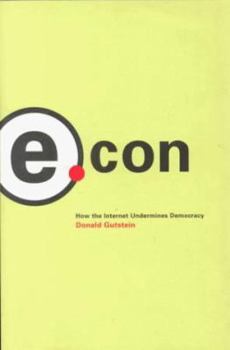E.Con: How the Internet Undermines Democracy
The Internet. We think of it as a marvellous, sprawling, open market, a worldwide bazaar in which ideas and information are free for the taking. But increasingly the Internet is becoming a commercial... This description may be from another edition of this product.
Format:Paperback
Language:English
ISBN:0773760563
ISBN13:9780773760561
Release Date:January 1999
Publisher:Stoddart
Length:320 Pages
Weight:0.98 lbs.
Dimensions:0.8" x 6.0" x 9.0"
Customer Reviews
2 ratings
Public good or commodity: Information and democracy
Published by Thriftbooks.com User , 23 years ago
Gutstein's book is a must read for information professionals, politicians, and indeed, anyone living in Canada and the US. The premise of the book exposes the reality of corporate interests seizing power and control away from the people. Government deregulation and the uncontrolled world of electronic commerce have fostered the growth of corporate monopolies, which have been swallowing up information resources at staggering rates. Gutstein carefully deconstructs the myths of universal access and electronic commerce to illustrate that corporate giants are being built at the expense of the public good. The numbers of information poor are growing and their rights are being overshadowed by the ambitions of industry. Gutstein's work is thorough and his references are interesting reading on their own. The book is written in a captivating and clear style, all the more reason for every citizen to pick it up. I strongly recommend this book for your local library or personal collection. Technology is not the problem, only how we use it.
Topical Passionate Plea for Wired Democracy
Published by Thriftbooks.com User , 24 years ago
Despite chapter headings related to Canada, the public sector, and the Internet, this book powerfully debates global issues on personal freedom and intellectual property rights. The Canadian Government is portrayed as weak-willed, and often out-of their depth; and myriad arrogant US lobbying bodies as greedy, manipulative, and protective of global empire-building US corporations rather than the individual.The books addresses: the Connecting Canadians governmental program; the information industry's invasion of the public library system; the secret agenda and machinations of Canadian Government; the entry of telephone companies into the content business; enclosing the information commons; academics building intellectual property portfolios; IBM colonizing the education sector; the wants of industry; and a manifesto for reclaiming public information.The Connecting Canadians 6 program goals are: to get all 16,500 schools and 3,400 libraries connected to the Internet; to promote e-commerce; to increase Canadian content; put government information and services on the Internet; to connect municipal governments to local residents and businesses (i.e. Smart Communities); and to connect Canada to the rest of the (developed) World to attract investment. Gutstein asserts that democracy is threatened by the Connecting Canadians knowledge-economy theme, and Bill C-54 the Protection of Personal Information and the Electronic Authentication Act, together aimed at minimizing the cost of privacy violation to potential economic growth of the information industry. The information industry- computer hardware and software vendors, telephones companies, cable companies, media/TV/newsprint companies- are described as variously hijacking related joint public-private sector initiatives seeking to profit from public-sector investments and information. Publishers as a norm, now break copyright through unauthorized electronic/database re-publishing on the Web of author's work. Land enclosures and powerful landlords in the middles ages actually reduced productivity innovations, and prosperity. Similarly, today Intellectual Property Rights (IPR) landlords (e.g. Bill Gates, Disney) are building up global empires of content, restricting freedom and increasing costs of access to quality information. Powerful US lobbyists have pursued extra IPR protection for US corporations in IT, pharmaceuticals, and chemical processing as US global competitiveness in other manufacturing industries has fallen behind Asia and Europe. Changes relating to IPR in NAFTA and GATT/WTO in just pharmaceuticals, have cost Canadians an extra $400 million per year since 1988. Linux is held up as an example of no-copyright high quality `bazaar' construction with orders of magnitude greater top level skilled development time, than `cathedral building' (i.e. fewer high-skilled, more technicians) copyrighted unreliable Microsoft Windows. The current commercialized Canadi





